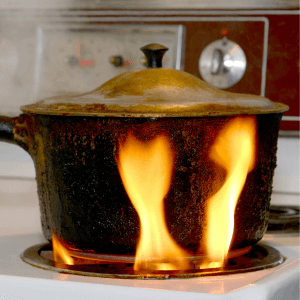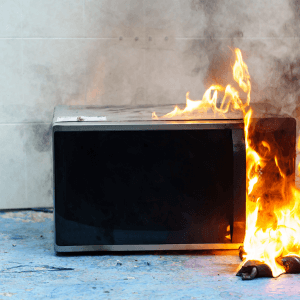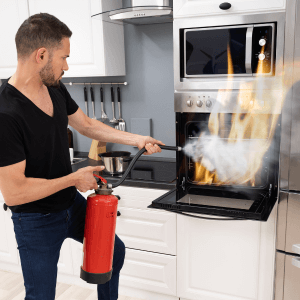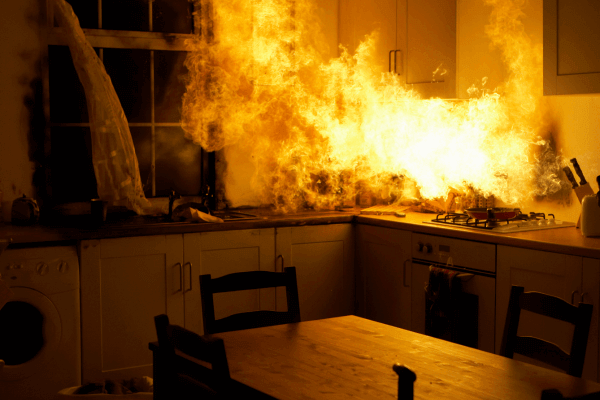Kitchen fires can start in a blink of an eye. From a simple toast that’s been left unattended to a grease fire that erupts on the stovetop, these incidents can quickly turn into a major problem. But don’t worry, we’re here to help.
In this post, we’ll dive into the different types of kitchen fires, what to do if one starts, and how to prevent them from happening in the first place. We’ll also talk about how Sapphire Restoration can help you if you’ve experienced fire damage.
So, whether you’re a seasoned chef or a kitchen newbie, this guide will give you the knowledge and confidence to stay safe and sound in your culinary adventures.
Identifying Different Types of Kitchen Fires
Oven Fires
Oven fires often occur when food spills and ignites, or when the oven is filled with grease and grime. These fires can be deceptive, as they may be contained within the oven but can still cause significant smoke damage if not addressed right away.
To prevent oven fires, always keep your oven clean and free of food debris. Use a baking sheet to catch spills when cooking, and avoid using excessive amounts of oil or butter that can splatter and ignite. If an oven fire occurs, turn off the oven immediately and keep the door closed to smother the flames.
Microwave Fires
Microwave fires can be caused by placing metal objects inside, overcooking food, or using containers that are not microwave-safe. These fires can rapidly produce smoke and cause considerable damage.

To prevent microwave fires, never use metal cookware or foil. Always follow cooking instructions and use microwave-safe containers. If a fire starts, turn off the microwave and unplug it if safe to do so. Keep the door closed to contain the fire.
Toaster and Grease Fires
Toaster fires are typically caused by crumbs accumulating in the toaster, which can ignite during use. Regularly clean your toaster to remove any buildup, and never leave it unattended while in use.
Grease fires, on the other hand, are one of the most dangerous kitchen fires. They occur when cooking oils or fats become too hot and ignite. Never attempt to extinguish a grease fire with water, as it can cause the fire to spread. Instead, cover the flames with a metal lid, and turn off the heat source.
Electrical Fires
Electrical fires can happen when kitchen appliances malfunction or are used improperly. These fires often start behind appliances or in outlets due to faulty wiring or overloaded circuits.
To minimize the risk of electrical fires, ensure all appliances are in good working condition and avoid using extension cords in the kitchen. If an electrical fire occurs, use a Class C fire extinguisher to put it out, and never use water.
Immediate Actions to Take When a Kitchen Fire Starts
For Oven and Microwave Fires
When faced with an oven or microwave fire, it’s crucial to remain calm and act quickly. Turn off the appliance and unplug it if possible. Keep the door closed to prevent oxygen from fueling the flames further. If the fire does not extinguish quickly, evacuate the home and call emergency services.

For Grease Fires
Grease fires require special care due to their volatile nature. Immediately turn off the heat source and cover the flames with a metal lid, baking sheet, or a damp cloth. Avoid using flour or baking powder,
as these can exacerbate the fire.
For Electrical Fires
For electrical fires, the first step is to turn off the power source. If the fire is small, use a Class C fire extinguisher to put it out. If you do not have an appropriate extinguisher, evacuate the home and call emergency services.
Preventing Kitchen Fires
Maintenance and Cleaning Tips
Regular maintenance and cleaning can significantly reduce the risk of kitchen fires. Keep your oven, microwave, toaster, and other appliances free of debris and grease. Routinely inspect appliances for signs of wear and tear, and replace or repair faulty equipment asap.
Safe Cooking Practices
Practicing safe cooking habits is key to preventing kitchen fires. Always supervise cooking and avoid distractions. Keep flammable items like kitchen towels and paper towels away from heat sources. Use a timer to remind you of cooking times, and never leave appliances unattended.
Read more from our blog: Fire Safety in the Kitchen During the Holidays
How to Use Fire Extinguishers and When to Evacuate
Using Fire Extinguishers
Knowing how to use a fire extinguisher is vital in combating kitchen fires. Remember the PASS technique:
- Pull the pin to break the tamper seal.
- Aim the nozzle at the base of the fire.
- Squeeze the handle to release the extinguishing agent.
- Sweep the nozzle from side to side until the fire is out.
Have a fire extinguisher readily available in the kitchen, and double-check that it is up-to-date and can handle different types of kitchen fires.
Learn more from OSHA: Fire Extinguisher Use.
When to Evacuate
If a fire cannot be contained quickly, get out of the home and call 911. Prioritize safety over property. Never, ever attempt to fight a fire that is spreading fast!
Post-Fire Steps: How to Clean Up and Be Safe
Cleaning Up After a Fire
After a fire, it’s essential to assess the damage and proceed with cleanup carefully. Ventilate the area to remove smoke and odors. Clean surfaces with a mixture of water and mild detergent, and dispose of any items that are beyond repair or heavily damaged. Read more about smoke damage clean up here: Guide to Cleaning Smoke Damage
Ensuring Safety
Inspect the kitchen for structural damage and consult professionals like Sapphire Restoration for comprehensive fire damage restoration services. Our certified specialists can address smoke damage, odor removal, and restore your property to its pre-loss condition.
Read more from our blog: Complete Guide to Assessing Fire Damage: What You Need to Check
Final Word on Kitchen Fire Restoration
Kitchen fires can be scary, but they don’t have to be a disaster. By following the tips we’ve discussed, you can significantly reduce your risk of experiencing one. Remember, prevention is key, but if the worst happens, we’re here to help.
At Sapphire Restoration, we’re committed to restoring your home to its original state after a fire. Our team of experts has the skills and experience to handle any situation, big or small.
Need some help after a kitchen fire? Don’t hesitate to call us today. We’re ready to provide you with the support and services you need to recover from a fire.

